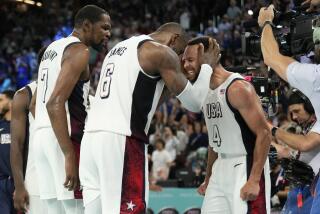It’s Time to Dream On
- Share via
COLORADO SPRINGS, Colo. — The Dream Team concept may finally be put to rest.
According to NBA Commissioner David Stern and Deputy Commissioner Russ Granik, future U.S. Olympic men’s basketball teams might be selected based more on strategic needs than a desire to assemble an all-star team of the NBA’s most marketable and talented players.
For the 2004 Games in Athens, that shift in thinking could result in the selection of players who are defensive specialists or backups at their positions, not merely front-line players who are accustomed to playing a lot of minutes.
The philosophical change acknowledges the end of the U.S. dominance of men’s basketball, as seen at the Sydney Games.
Five of the U.S. team’s victories were by 15 points or fewer, and it was nearly upset by Lithuania in the semifinals before holding on for an 85-83 victory. France pulled within four points of the United States in the second half of the gold medal game before the Americans pulled away to win, 85-75.
U.S. Olympic squads are selected by a USA Basketball committee. Granik also serves as the president of USA Basketball.
“An all-star team may or may not be the best representation in a true competition,” Stern told Australian reporters this week.
“Perhaps we will put together a team that doesn’t contain as many superstars, but has role players that fit in well. That’s the ultimate compliment to the intensity of the competition.”
The shift also fits with the NBA’s dislike of the “Dream Team” label, originally applied to the 1992 team.
Assembled because most other countries preferred to compete against the best players in the world instead of merely the best U.S. college players, the 1992 squad included Michael Jordan, Magic Johnson, Larry Bird and Charles Barkley and steamrollered its opponents in winning the gold at Barcelona.
The nickname was resurrected in 1996 at Atlanta, where the United States won again, but its validity was weakened at Sydney after players such as the Lakers’ Shaquille O’Neal and Kobe Bryant declined to participate and injuries sidelined Tim Duncan and Grant Hill.
Granik indicated greater consideration will be given to choosing players to fit specific slots, in hopes of developing cohesion and harmony. Lithuania coaches in particular said they had been able to capitalize on the United States’ deficiencies in those areas.
“This is something we’ve all been talking about,” Granik said. “But I think that sort of relates to the acknowledgment that perhaps our team didn’t play as well as might have been hoped this time around, which I don’t think we can deny.
“There’s been a lot of discussion that one of the problems that our team and coaching staff face all the time with the senior men’s team is that you end up with a lot of all-stars and players that want to get their fair share of minutes.
“I think we’re finding that that might not necessarily be the best way to run a team to win games, that perhaps you need a few players at the end of the bench who don’t have to get exactly the same 20 minutes that the guy who started gets. And that’s one thing that we’ll probably be exploring when we talk about picking the next set of people.”
Lesser names may also bring smaller egos. The United States was criticized for its arrogance at Sydney, and Vince Carter was involved in a confrontation with Australia’s Andrew Gaze and Shane Heal in an exhibition game at Melbourne.
“I think by and large, our guys were good citizens over there,” Stern said. “There may have been some antics that were very, very mild by NBA standards. But perhaps we need to do a much better job educating them as to how the etiquette changes in international competition.”
More to Read
Go beyond the scoreboard
Get the latest on L.A.'s teams in the daily Sports Report newsletter.
You may occasionally receive promotional content from the Los Angeles Times.







